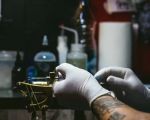Tattoo Artists for Line Work Precision: The Art of Perfect Lines
When I first decided to get a tattoo, I knew that precision was key, especially when it came to line work. I wanted clean, crisp lines that would age beautifully over time. After researching and speaking to several tattoo artists, I realized just how important it is to find the right tattoo artist with expertise in line work precision. Tattooing isn’t just about slapping ink on skin; it’s about creating a lasting piece of art that requires both technical skill and creativity. If you're also looking for sharp, detailed lines in your tattoos, here's everything I learned along the way about finding the right artist for this delicate work.
1. What Makes Line Work Precision Important in Tattooing?
Line work is the backbone of many tattoo styles, whether it’s blackwork, neo-traditional, or geometric tattoos. Precise lines ensure that the tattoo will look sharp and clean, standing the test of time. As tattoos heal, the ink may blur slightly, so sharp, well-executed lines make all the difference in how the final design will look long-term.
For me, line work precision was especially important because I wanted a tattoo that looked great up close and from a distance. If the lines are too thick, uneven, or shaky, it can ruin the entire tattoo’s aesthetic. This is why choosing a tattoo artist who specializes in line work precision is critical for a successful outcome. The quality of the lines will define the tattoo, and precision here matters far more than it might seem at first.
2. The Skills Required for Line Work Precision in Tattooing
Line work isn’t something every tattoo artist excels at. It requires a specific set of skills that only the most experienced artists can master. For example, an artist needs steady hands, a deep understanding of skin anatomy, and the ability to maintain consistent pressure on the needle throughout the tattooing process.
When I met with my tattoo artist, I was amazed by how they explained their approach to line work. They mentioned that controlling the needle speed and depth is essential for producing crisp lines that won’t fade or bleed out over time. The needle needs to penetrate the skin just right—not too shallow and not too deep. This creates clean, sharp lines that look as good in a year as they do the day the tattoo is done.
Another skill involved in precision line work is understanding how ink flows through the needle. A good tattoo artist knows how to control the ink to ensure the lines stay even throughout the design. For more complex designs, they also need to pay attention to the intricacies of shading, blending, and layering, all of which add to the final precision of the lines.
3. Different Tattoo Styles That Rely on Line Work Precision
Not all tattoos are created equal, and the need for precise line work varies depending on the style. For example, black-and-grey tattoos and minimalistic line tattoos require a steady hand and the ability to keep lines thin and exact. If you’re a fan of geometric tattoos, crisp lines are absolutely essential to maintaining the integrity of the design.
During my search for the perfect tattoo artist, I found that certain styles demand even more skill when it comes to line work. Take traditional Japanese tattoos, for example, where strong, bold lines are a hallmark of the style. In these cases, the artist needs to make sure the lines are not only precise but also bold enough to stand out without losing their sharpness over time.
On the other hand, some modern tattoo styles, like fine line tattoos or blackwork, require incredibly delicate, intricate lines that need to be perfect for the tattoo to maintain its sharpness and clarity. Fine line tattoos, especially, are heavily reliant on the artist’s ability to create smooth, continuous lines that give the design an elegant, refined look. I was impressed by how certain tattoo artists could draw incredibly fine lines that almost looked like they were etched into the skin, making the designs appear almost three-dimensional.
4. How to Find the Right Tattoo Artist for Line Work
Finding the right tattoo artist for line work can be a bit challenging, but it's absolutely worth the effort. Here are some tips I used during my search to ensure that I found someone who could handle the precision required for my tattoo:
- Research Their Portfolio: I spent a lot of time browsing through tattoo artists’ portfolios, focusing specifically on their line work. I looked for clean, crisp lines and minimal distortion, as well as tattoos where the lines were smooth and evenly spaced. Any artist who specializes in line work will showcase their best examples of this style in their portfolio.
- Check Reviews and Recommendations: Reviews and word-of-mouth recommendations were key in my search for a skilled artist. I asked friends and checked online reviews for artists who had a reputation for precision. Good reviews from other clients helped me find an artist who was known for doing excellent line work.
- Consult with the Artist: Once I narrowed down my choices, I set up consultations with the artists I was interested in. This was a great opportunity to ask about their approach to line work, discuss the design, and see if we were a good fit. Many artists are happy to talk about their techniques and share their experience, which can help you feel more confident in your choice.
5. Common Mistakes in Line Work Tattoos and How to Avoid Them
Line work tattoos can be tricky, and mistakes can happen, especially if the artist is inexperienced or doesn't specialize in this style. One common issue is uneven lines—lines that are too thick, too thin, or wobbly. This often happens when the artist doesn't maintain a steady hand or doesn't understand the proper needle technique. For me, one of the most frustrating things would have been to see my tattoo fade or distort over time because of poor line work.
Another issue is ink bleeding, where the ink spreads beyond the lines, causing a blurry or smudged effect. To avoid this, it’s crucial to choose a tattoo artist who has mastered the skill of controlling needle depth and ink flow. I made sure to ask my artist how they handle this problem, and they reassured me that their technique prevents any bleeding from happening, ensuring that the lines stay sharp and clean throughout the healing process.
6. The Long-Term Care of Line Work Tattoos
After you’ve had your line work tattoo done, it's essential to take care of it properly during the healing process. A well-cared-for tattoo will maintain its precision for years to come. I made sure to follow my artist’s aftercare instructions, which included keeping the tattoo clean, moisturizing it, and avoiding direct sunlight or soaking it in water for extended periods.
One of the things I learned is that tattoos with fine line work can be more prone to fading if not taken care of properly. The better the aftercare, the longer the lines will stay crisp and clean. I also found that getting touch-ups as the tattoo ages is a good way to maintain its sharpness, especially for tattoos that require fine, delicate lines.
Taking care of your tattoo is a long-term commitment, but with the right artist and aftercare routine, you’ll be able to enjoy your beautiful, precise line work tattoo for many years to come.








